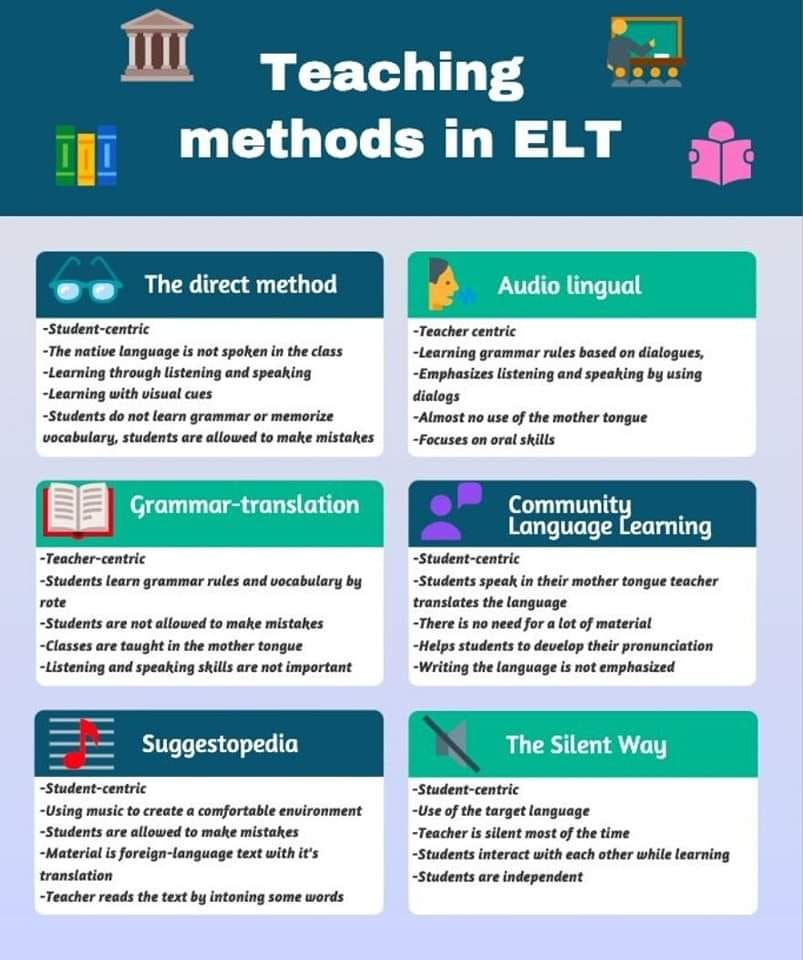🌟 1. Lecture-Based Method
Definition:
- A teacher-centered approach where the instructor delivers content directly to the students, often through explanations, presentations, or storytelling.
- Students take notes, listen, and absorb knowledge passively, with limited interaction during the session.
Example in TEFL:
In an English grammar class, the teacher explains conditional sentences (e.g., "If I had studied, I would have passed"), provides examples, and writes rules on the board. Students listen, take notes, and later complete exercises to practice the forms.
Advantages:
- Efficient for delivering large amounts of information in a short time.
- Provides a clear structure and expert knowledge.
Challenges:
- Passive learning; students have fewer opportunities to practice language skills.
- Limited engagement, especially in language learning, where communication is crucial.
🗣️ 2. Communicative Language Teaching (CLT)
Definition:
- A learner-centered method that emphasizes real-life communication and the practical use of language.
- Focuses on fluency over accuracy, encouraging learners to use language in authentic contexts.
Example in TEFL:
In a lesson on ordering food at a restaurant, students role-play as customers and waiters. They practice phrases like:
- "Can I have the menu, please?"
- "I'd like a cheeseburger with fries."
The teacher monitors and provides feedback after the activity.
Advantages:
- Improves communication skills and confidence.
- Provides meaningful practice in authentic situations.
Challenges:
- Accuracy might be overlooked.
- Requires skilled teachers who can manage open-ended activities and give constructive feedback.
✅ 3. Task-Based Learning (TBL)
Definition:
- A student-centered method where learners complete meaningful tasks using the target language.
- The focus is on achieving an outcome rather than on language forms.
Example in TEFL:
Students are asked to plan a trip to London in groups. They research:
- Places to visit.
- Budget for accommodation and food.
- Transportation options.
They then present their plans to the class. Throughout the task, they practice problem-solving, collaboration, and language skills like negotiation and explanation.
Advantages:
- Engages learners with real-world tasks.
- Develops problem-solving and collaboration skills.
Challenges:
- Can be difficult to assess language proficiency separately from task completion.
- Requires careful planning to ensure tasks align with learning objectives.
📌 4. Project-Based Learning (PBL)
Definition:
- Involves students in long-term projects that require research, collaboration, and creativity.
- The project acts as a vehicle for language learning, integrating multiple skills.
Example in TEFL:
In a unit on Environmental Issues, students create a campaign to raise awareness about plastic pollution. The project includes:
- Researching the impact of plastic on marine life.
- Designing posters and social media content.
- Presenting findings and solutions in a class presentation.
Advantages:
- Encourages creativity, collaboration, and critical thinking.
- Gives learners ownership of their learning.
Challenges:
- Time-consuming.
- Requires strong guidance from the teacher to keep students on track.
🔄 5. Flipped Classroom
Definition:
- Reverses the traditional classroom model: students learn new content at home through videos, readings, or podcasts, and then use class time for practice and discussion.
- Promotes active learning during class.
Example in TEFL:
Before a lesson on phrasal verbs, students watch a YouTube video explaining common phrasal verbs like:
- "Give up" (to quit).
- "Run into" (to meet by chance).
In class, students play a game where they act out phrasal verbs for their classmates to guess, followed by discussions on how to use them in context.
Advantages:
- Maximizes in-class time for practice and feedback.
- Supports self-paced learning.
Challenges:
- Requires reliable access to technology.
- Students may not complete the pre-class work, limiting in-class effectiveness.
 Other methods (TeacherTalkingTogether on Facebook)
Other methods (TeacherTalkingTogether on Facebook)